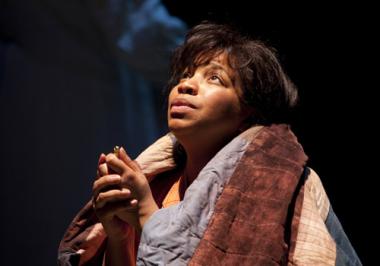Everyman is the archetype of medieval theater. The 15th-century play follows a typical, flawed human in his search for suitable companions to accompany him on his journey toward death. In the end, the moral is that only Good Deeds will see you successfully into the next life. It's a lot like karma, but with a decidedly Christian spin.
The characters in the allegorical dramas known as morality plays are personifications of moral attributes and worldly attachments. The title character in Everyman thinks that Goods, Beauty, Strength and other assets will go with him to heaven, but only Knowledge hangs in as far as the grave, and only Good Deeds endures beyond there.
Valerie Gramling, a Ph.D. candidate in medieval English literature at UMass, directs next weekend's production by the Renaissance Center Theatre Company. She says she was attracted by the play's timeless message—"Ultimately, you're defined by your deeds." Seven local actors depict the play's 16 archetypes, with Marissa Sicley in the title role, following a 19th-century tradition of casting a woman as Everyman.
Gramling's hour-long production makes the dramatic journey physical as well as metaphorical, with the audience following the action through the hallways and classrooms of Bartlett Hall on the university campus. (There are chairs for those who can't stand for long.) Gramling says the academic setting also highlights the character of Knowledge, "the one worldly attribute that remains up to the end."
Everyman: Feb. 19-21, free, Bartlett Hall, UMass-Amherst, (413) 577-3600 or renaissance@english.umass.edu.
A Patchwork of History
Gee's Bend is an isolated all-black hamlet tucked into an oxbow on the Alabama River. Until recently, the community's residents, descendants of slaves and sharecroppers, lived in poverty and obscurity. But in 2002, all that changed. The community is distinguished by its handmade quilts, fashioned from scraps of material in a distinctive style passed down through generations of women. A museum exhibition of the quilts caused a sensation in the art world, and the women of Gee's Bend were lionized as folk artists, their unique patterns likened to both Amish textiles and abstract expressionist art.
Gee's Bend is an episodic, fictionalized history of the town and its quilters, tracing three generations of women from the Depression through the Civil Rights movement to the present. Hana S. Sharif's production at Hartford Stage contains four strong performances and some terrific black country gospel music. But it struggles vainly with a clunky script that reduces the inspiring story of a perseverant community to an historical soap opera.
It centers on smart, strong Sadie (Kimberly Hebert Gregory), bantering with her imperious mother (Miche Braden) and feckless sister (Tamela Aldridge), marrying hardworking farmer Macon (Teagle F. Bougere), then battling him when she decides to join Dr. King's march on Selma, and finally marveling in disbelief in New York's Whitney Museum at seeing "these white folks paying a lot of money just to see our trash."
Playwright Elizabeth Gregory Wilder treats the potentially rich material like one of those TV miniseries about one family's trials and triumphs against a backdrop of turbulent times. The dialogue is less colorful than a lot of real Southerners' speech, and both the sentimental and angst-ridden moments are hopelessly cliched.
Gee's Bend: Through Feb. 14, Hartford Stage, 50 Church St., Hartford, (860) 527-5151, www.hartfordstage.org.



